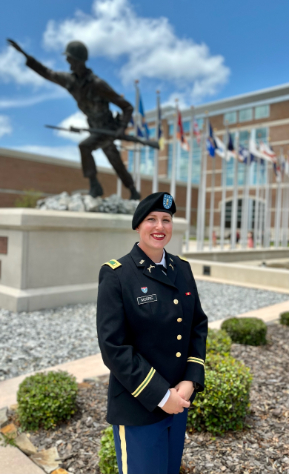Cassie Morris comes from a military family, and serving her country is deeply ingrained in her beliefs. She considered enlisting right out of high school, but her Aunt, an Officer in the US Army encouraged her first to attend college. She earned her degree in Geography but couldn’t shake her desire to join the military.
“Every two to three years, probably since I graduated from college, I talked to a recruiter in some way, shape, or form in different branches,” Cassie said.
But she was torn. Should she stick with her nascent professional career or leave it behind to follow her dream – and family's footsteps – in the military? Plus there are other considerations like meeting financial needs and balancing military and corporate lifestyles.
Serving in the military is often a family affair. According to Pentagon data, 80 percent of new recruits come from a military family and more than 25 percent have a parent who wore a military uniform. Often they build careers in the military. Many learn valuable skills they use to build a career in a particular industry such as manufacturing or high tech. Military vets make up 5.6% of the workforce, according to 2020 Department of Labor Statistics. Many industry leaders believe that number should be much higher, so they’re finding ways to remove roadblocks that inhibit military veterans from joining the workforce.
Even after Morris started working as a sales development representative at hybrid cloud software company Nutanix in 2020, she continued to talk with recruiters. co-workers about Project Victory, a Nutanix employee-led group supporting veterans, citizen soldiers and allies of each.
“They told me if you're gonna do it, do it now, or you're gonna regret it,” Morris said.
With that encouragement and support, she made the leap and applied to the Army’s Officer Candidate School.
“I went for it, and I’m so happy I did,” said Morris.
In doing so, she would become one of the many reasons why U.S Veterans Magazine named Nutanix as one of the top veteran-friendly companies in 2022.
Veterans as Coworkers
She signed in July 2021 and didn’t have to report to basic training until January 2022. That’s when she leaned heavily on Project Victory. As Morris spent time volunteering with Project Victory as an event planner and coordinator, she saw firsthand how the group would rally around her decision.
“It was phenomenal because so many people reached out to me, and they gave me tips and tricks and things that they went through when they were active in the military,” Morris said. “It really helped prepare me, so I wasn't walking in without any knowledge and knew I had a strong support group to rely upon.”

Cassie Morris the day she graduated from Officer Candidate School.
Mariah Melligan, a federal account manager at Nutanix, is one of those people who supported Morris. Milligan spent six years in the Marine Corps and then immediately joined the North Carolina National Guard where she continues to serve.
“I told her I could help with the fitness test because I evaluate and grade for the National Guard. Also, as a woman, you go through different things, being in basic training and in the field, and I told her to reach out to me with any questions,” Melligan said.
That guidance proved essential, and even more so now that Morris is back at work. Both say re-entering into civilian life can be emotionally difficult.
“Every single day for seven or eight months, I didn’t have my own life or my own schedule,” Morris said.
“Everything was pre-planned at a designated time. You’re in bed at 8:30 p.m., and you’re up at 4:30 a.m., so that was an adjustment.”
Balancing a Career and Military Service
When an employee goes out on military leave, their job is protected, but not all companies pay the difference between their military pay and civilian job salary. This and other concerns inspired Scott Ragsdale, who leads Nutanix’s Americas Healthcare business, to form the employee-led Project Victory group in 2018. Nutanix CIO, Wendy M. Pfeiffer, signed on as an executive sponsor.
Pfeiffer said she sees the irony in companies that hesitate to hire vets with proven abilities to show up, get trained, serve and excel in extreme environments.
“If they managed in life-and-death situations, 24 hours a day, a complex system, I think they’re going to be able to learn Windows or how to automate,” she said. “As a global society, we have a responsibility to employ these people.”
Employers aren’t required to pay an employee on military leave of absence, but Nutanix offers six months of paid leave, which is reduced by military pay. This six-month pay differential was one of Scott’s first priorities after forming Project Victory.
In some cases, an employee’s income can get cut in half or a third during a period devoted to military service, said Ragsdale
”They still have all the bills,” he said. “Maybe they're leaving a spouse to watch the kids, and he or she has to come up with the mortgage every month, in addition to the stress that goes along with this decision.”
Since 2019, ten Nutanix employees have taken military leave. Benefits from Project Victory give these employees and their families a little extra piece of mind while serving in the military.
Beyond Financial Support
Ensuring the pay is one thing, but for Morris, whenever she had a paperwork issue or other benefits question, it was addressed quickly by her Nutanix HR representative.
“Sometimes I was in the field for two weeks doing a training exercise and being offline,” Morris explained. “It was amazing that they monitored things for me.”
Morris compares the benefits of military leave to maternity or paternity leave. While not as common as going out on leave after the birth or adoption of a child, educating co-workers and managers is key. That way there is no confusion and expectations are clear when an employee goes on military leave and when they come back. Just like parents have other responsibilities, so does Morris. That doesn’t mean she’s not committed to her work at Nutanix.
“I don't feel like it’s ever going to be ‘you have to decide between the two,” said Morris’ “I've never felt that way, and I've talked to others who have been in the reserves for a while or the National Guard, and they have assured me that I’ll never have to choose.
“With Nutanix, I’ve never heard anyone say ‘we wish you weren’t going.’ It's always, we support you and what you're doing.”
Morris completed Basic Training and Officer Candidate School. She earned her Commission as a 2nd Lieutenant in the U.S. Army, but she’s not finished with her schooling. She still has an 18-week course to become branch certified as a Military Police Officer. Even though her military service does not directly translate into her sales career, Nutanix and the support of Project Victory empower her to do both.
Liza Meak is a contributing writer and senior manager of employee and executive communications. Find her on Twitter @lizameak and on LinkedIn.
© 2022 Nutanix, Inc. All rights reserved. For additional legal information, please go here.




